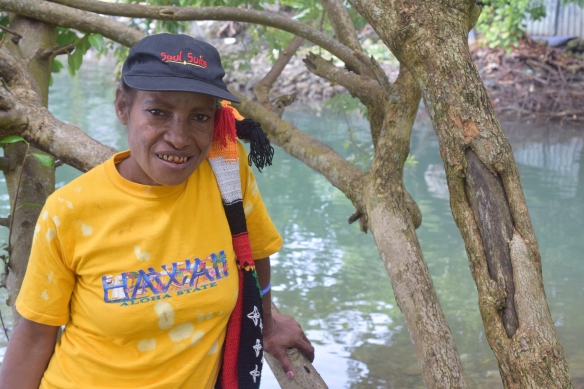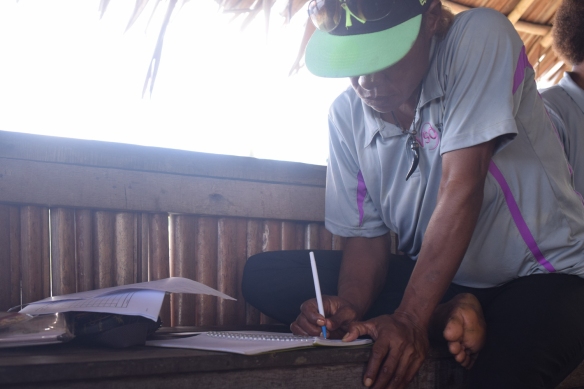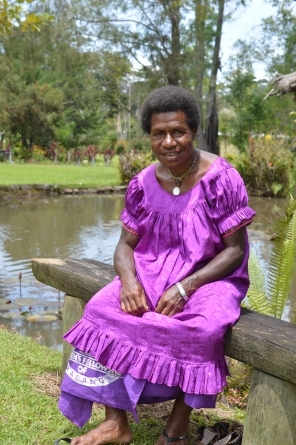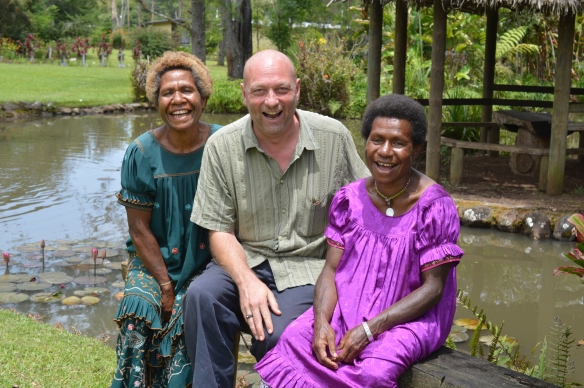Margret Noel is 32-years-old from Simbu in the highlands of Papua New Guinea (PNG). Life has not been easy for Margret. In 2002 she came to live on the streets of Madang as she had to leave her abusive husband in her village. With no real education, she set up a life selling buai (betel nut, a mild stimulant) and cigarettes on the street.
In 2005 she got married to another man from Simbu and life began to look brighter but a couple of years after they got married her husband was diagnosed with HIV. A year after his diagnosis Margret attended self-care training to learn how to look after her husband, it was during this training that she learnt about how HIV is contracted, the importance of using condoms which previously she didn’t know and that she also needed to be tested for the virus.
“When they told me that I was HIV positive I broke down, I was angry because I hadn’t been tested sooner and I knew that I needed to begin treatment straight away.”
Soon after, she was tested at Id Inad clinic in Madang where she found out that she was also HIV positive: “When they told me that I was HIV positive I broke down, I was angry because I hadn’t been tested sooner and I knew that I needed to begin treatment straight away, but I was able to find strength as I knew that if I took the medicine I would be fine as I had learnt about anti-retroviral treatment during the self-care training.”
Following on from her diagnosis Margret felt like she had to do more to help people with HIV and raise awareness about the risks of catching the virus. Initially she became a community health based carer where she gave care and support for patients who have reached the final stages of the virus.
In 2010 she became a peer educator for FHI 360 and later for Voluntary Service Overseas. The USAID funded, Strengthening HIV/AIDS Services for Key Populations project, works through enhanced peer educator outreach to specifically target hard to reach, key populations. The key populations that are the core focus of this work are men and women in transactional sex, men who have sex with men, transgender and high-risk men and women who are having sex with multiple partners.
Peer educators are selected from members of the high-risk groups to reach out to the key populations. In this role Margret goes to identified hotspots looking for potential clients to encourage them to get tested for STIs and HIV and to seek proper treatment. She also speaks out openly at big events about being HIV positive: “Now I have the confidence to stand up in public and talk about what I have learnt. I share with people that I’m HIV positive, I tell them about the work that I do and that I take the medicine. The first talk that I gave was at a school. When I began to speak I couldn’t help but cry, it was really hard to share such a personal experience and disclose my status to people. It was the children’s first time to see someone with HIV so they were very surprised because I didn’t look sick. Because I don’t have any sores they thought that I was lying so I showed them the medicine that was in my bilum and told them that it was helping me. I told them that if they hug me they won’t get HIV and was able to tell them about the ways that you contract the infection.”
HIV is still very much a taboo subject in PNG but through Margret disclosing her status and giving awareness talks, people approach her on the street for more information and look to her as a role model: “When people see me on the street they come to talk to me. They ask me where to go to get treatment. Often people don’t speak out when we are in the talks or discussions but they recognise me and find me when I’m in town so that they can talk confidentially. Since I disclosed my status I have helped so many people; people give me presents from bilums to food to say thank you.”
Through her work Margret can now read and write in English. Her courageous actions have made a real difference to people in her community, she has assisted over 50 patients in community based care and over 50 of her clients have been diagnosed with HIV when they have been tested at the clinic: “It makes me really happy to have the talent to save people’s lives, by getting them to go to the clinic for testing and I help with ensuring that patients continue to take their medicine regularly. Other peer educators are previous clients that have come to me to find out more information and are now helping other people who are living with HIV.”
“It makes me really happy to have the talent to save people’s lives, by getting them to go to the clinic for testing.”
In her community Margret is well-respected and her friends and family are supportive. Her adopted 4-year-old daughter helps remind her to take her medicine at the right time: “Now I am strong. Now that I have disclosed to people I get a lot of respect and I have been able to share my knowledge and help them to understand the importance of safe sex, getting tested and accessing the right treatment.”





 At first glance Angela Kaupa may look like just another tiny grandmother with dimpled cheeks and a quiet, reserved demeanor but she is an exceptionally important figure within HIV support and is renowned within her community in the Eastern Highlands.
At first glance Angela Kaupa may look like just another tiny grandmother with dimpled cheeks and a quiet, reserved demeanor but she is an exceptionally important figure within HIV support and is renowned within her community in the Eastern Highlands.

